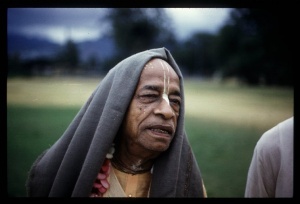750428 - Morning Walk - Vrndavana

A.C. Bhaktivedanta Swami Prabhupada
Prabhupāda: . . . and it is still going on all over the world. So what is the use of observing centenary for a dead system of religion, and which is not very old, not even hundred years? So what is the use? Maṇḍanam loka-rañjanam (Hari-bhakti-sudhodaya 3.11). Aprāṇasya hi dehasya maṇḍana, with the body which is already dead, if you decorate it, it may be very pleasing to some, loka-rañjanam, but it has no meaning.
Puṣṭa Kṛṣṇa: Prabhupāda, sometimes during your lectures I hear you say yata mat tata mat?
Prabhupāda: Ah, yata mat tata patha.
Puṣṭa Kṛṣṇa: What does that mean?
Prabhupāda: That is Vivekananda's philosophy. "Whatever opinion you have got, that is also nice." That means even if we differ, your opinion, my opinion, your is good and my is good. That means no controversy, that's all: making compromise. If I say, "Your . . . your whatever you think . . ." This is going on. When Gandhi was approached that "You have got so much influence on the Muhammadans. Why don't you stop this cow slaughter?" Gandhi said, "No, it is their religion. I cannot stop." That is yata mat, that "Cow slaughter is also good, and cow not slaughter is also good." (chuckles) This is their philosophy. (break) What is called?
Acyutānanda: Yātrā.
Prabhupāda: Yātrā. To collect some money, that's all.
Acyutānanda: Then they arrange it so that they save the balance expenses.
Prabhupāda: Yes. That is the meaning of yātrā. Every one of our Godbrothers built here yātrā, but they have no other source of income.
Acyutānanda: Yesterday I was speaking to . . . I invited the chief guest, so I was speaking with . . . (break)
Prabhupāda: Sannyāsīra alpa chidra bahu-kori mane.
Tripurāri: During the āratik here at the temple, where should the women be standing?
Prabhupāda: Āratik, there are so many. That also . . . Caitanya Mahā . . . saw Jagannātha. There was crowd. One woman got up on His shoulder.
Tripurāri: During the āratik.
Prabhupāda: During . . . And He was seeing, and everyone saying, "Get! Get down!" Caitanya said, "No, don't disturb. Let her see. She has got so much eagerness."
Puṣṭa Kṛṣṇa: But we cannot imitate.
Prabhupāda: Imitation is always bad. Hare Kṛṣṇa. Jaya. Imitation is always bad.
Puṣṭa Kṛṣṇa: Did Śrī Caitanya Mahāprabhu have a daṇḍī or a tridaṇḍī?
Prabhupāda: Daṇḍī.
Puṣṭa Kṛṣṇa: Ekadaṇḍī.
Prabhupāda: He took sannyāsa from Māyāvādī.
Puṣṭa Kṛṣṇa: Why did Nityānanda Prabhu break His daṇḍa?
Prabhupāda: Caitanya Mahāprabhu does not require any.
Acyutānanda: After taking sannyāsa, though, He had śikha and tulasī mālā? No.
Prabhupāda: He was Māyāvādī. (chuckles) (laughter)
Acyutānanda: Someone wrote that only Caitanya Mahāprabhu can say ahaṁ brahmāsmi. He is the only Māyāvādī who can actually say aham brahmāsmi, because He is Kṛṣṇa.
Prabhupāda: He is brahmāsmi, no. He is parabrahmāsmi.
Acyutānanda: Parabrahmāsmi.
Prabhupāda: Kṛṣṇa-caitanya-nāmine. (end)
- 1975 - Morning Walks
- 1975 - Lectures and Conversations
- 1975 - Lectures, Conversations and Letters
- 1975-04 - Lectures, Conversations and Letters
- Morning Walks - India
- Morning Walks - India, Vrndavana
- Lectures, Conversations and Letters - India
- Lectures, Conversations and Letters - India, Vrndavana
- 1975 - New Audio - Released in May 2014
- Audio Files 05.01 to 10.00 Minutes